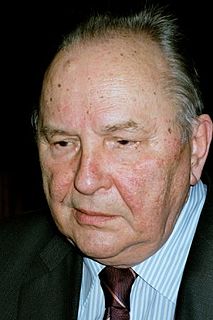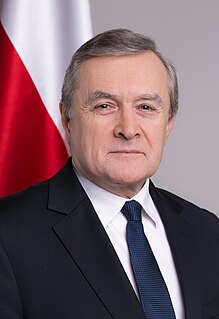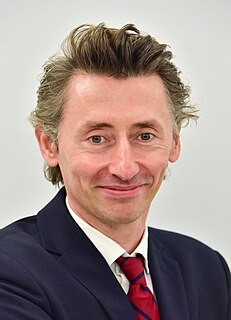
Edmund Wnuk-Lipiński was a Polish sociologist, political scientist, and writer. A professor of sociology, he was the founder and first head of the Polish Academy of Sciences' Institute of Political Studies, and rector of the Warsaw-based Collegium Civitas.

The flag of the city of Warsaw, the capital of Poland, is a bicolour rectangle, divided into two equally-sized horizontal stripes: yellow at the top, and red at the bottom. It was introduced in 1938.

Joachim Lelewel was a Polish historian, geographer, bibliographer, polyglot and politician.

Florian Witold Znaniecki was a Polish philosopher and sociologist who taught and wrote in Poland and in the United States. Over the course of his work he shifted his focus from philosophy to sociology. He remains a major figure in the history of Polish and American sociology; the founder of Polish academic sociology, and of an entire school of thought in sociology. He won international renown as co-author, with William I. Thomas, of the study, The Polish Peasant in Europe and America (1918–1920), which is considered the foundation of modern empirical sociology. He also made major contributions to sociological theory, introducing terms such as humanistic coefficient and culturalism.
Władysław Markiewicz was a Polish sociologist; professor of Adam Mickiewicz University in Poznań since 1966, and Warsaw University since 1972, director of the Western Institute in Poznań in years 1966–1973, member of Polish Academy of Sciences since 1972. He was the Polish-side Chairman of German-Polish Textbook Commission from 1972 to 1984.

Stanisław Ossowski was one of Poland's most important sociologists.
Jan Franciszek Czarnowski (1883–1963) was a Polish nobleman of Grabie coat of arms who was Papal chamberlain to Pope Pius XI, and head of the Polish Priory of the Order of the Knights of Malta. He was married to Helena (Lunia) Kalinowska, and owned the Rossocha estate, where he commissioned a palace, built by Juliusz Nagórski.

Jerzy Ryszard Szacki was a Polish sociologist and historian of ideas. From 1973 he was a professor at the University of Warsaw, and in 1991 became a member of the Polish Academy of Sciences. He is considered one of the most prominent representatives of the Warsaw School of the History of Ideas.

Maria Ossowska was a Polish sociologist and social philosopher.
Antoni Żabko-Potopowicz was an economist of agriculture, economic historian, and professor at Warsaw Agricultural University. He was a member of Polish Science Society and co-founder of the 1945 incarnation of the Polish Economic Society.

Kur is a Polish coat of arms. It was used by several noble families forming a Clan of Kur in the times of the Kingdom of Poland and the Polish–Lithuanian Commonwealth. It is noted during the reign of the Jagiellon dynasty and illustrated with its original name in the work of Bartosz Paprocki "Herby Rycerstwa Polskiego" in 1584. Furthermore, it is published in the work of Szymon Okolski in 1641. and several other publications

Sociology in Poland has been developing, as has sociology throughout Europe, since the mid-19th century. Although, due to the Partitions of Poland, that country did not exist as an independent state in the 19th century or until the end of World War I, some Polish scholars published work clearly belonging to the field of sociology.
Czesław Znamierowski (1888–1967) was a Polish philosopher, jurist and sociologist. He was Professor of Jurisprudence at the University of Poznań and chaired its Department of Legal Theory and Philosophy of Law. Znamierowski is noted in Polish law for his contributions to social sciences and jurisprudence, particularly the concept of legal system which is similar to H.L.A. Hart's ideas, but was published almost forty years before Hart's The Concept of Law.

Piotr Tadeusz Gliński is a Polish sociologist, professor, university lecturer and politician. He served as President of the Polish Sociological Association from 2005 to 2011. He was the nominee of Law and Justice, the largest opposition party, for Prime Minister of Poland. In the cabinet of Beata Szydło, he served as the First Deputy Prime Minister and the Minister of Culture and National Heritage in the Law and Justice government.
The Polish Statistical Association was established in Cracow in 1912. It is one of the oldest statistical associations in the world. Its first president, Juliusz Leo, was Professor of the Jagiellonian University and the President of Cracow. The main aim of PTS in the period before World War I was to prepare a statistical overview of the Polish lands from the most distant past until modern times. The work was published in Cracow in 1915 and was entitled "The Statistics of Poland".
Polish Society of Arts and Sciences Abroad is a Polish learned society located in London in the Polish Social and Cultural Association building. It was established in 1948 and its aim is to represent and support members of Polish academia who live and work abroad.
Tadeusz Romuald Jeziorowski is a Polish historian and writer specialising in weaponry, uniforms and orders.

Maciej Roman Gdula is a Polish sociologist specializing in social theory and political theory, as well as opinion journalist and politician.
Izabela Wagner-Saffray is a Polish born European sociologist. Wagner has been an Associate Professor at the Institute of Sociology at Collegium Civitas in Warsaw since December 2019. She is also a Fellow at ICM in Paris since 2019. Her sociological research is concerned with violin virtuosos. Wagner's contributions are focused on the careers of artists and intellectuals, professional socialization and geographic mobility, migrations and forced-migrations.










